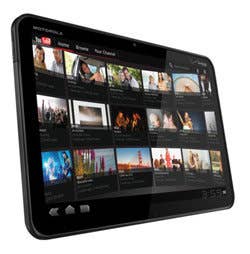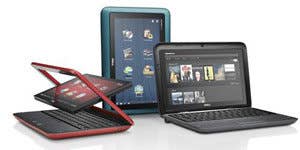CES' tablet warfare
Tech firms all maneuvering against the iPad
CES saw just a little chest-thumping from game companies - primarily in the form of Sony and Microsoft offering somewhat meaningless online account figures - but the real star of the show has been the explosion in tablets.
With iPad 2 still at rumour stage for now, the floor's been clear for Android and Windows-powered tablets to make themselves heard. The former's proving popular with a great many manufacturers, even though Google is yet to truly turn its operating system to tablets.

That won't happen until the 3.0 release, Honeycomb, which follows the impending Gingerbread. Google describes the UI as being "holographic" in Honeycomb, with a lot of emphasis on 3D elements - clearly hoping to battle Apple on the slickness front as well as in terms of raw tech.
Will the combing tablet war be comparable to Android's surprise success in the face of iPhone, or is it more akin to the iPod's rapid dominance of the MP3 player market? Pricing and app support will likely be the deciders - to date, the most appealing Android tablets (e.g. Samsung's Galaxy Tab) have been comparable to or even higher than the iPad's cost.
It's also hard not to see the similarities to the netbook explosion a couple of years ago, which many now claim has suffered heavily at the hands of the iPad. Tablets are the next big rush for every PC tech firm, but they're in for a hard fight against Apple's global awareness.
Certainly, though, tech firms are pulling out all the stops. Dell's announced a hybrid tablet/laptop, a hinged device with a foldaway keyboard, while Lenovo's gone one step further by making an Android-powered touchscreen removable from its Windows-powered base.
LG's one of the first to reveal a Honeycomb tablet, the G-Slate, while there's also the Morotola Xoom. Not too much is known for now, but that these can run Google Maps in 3D suggests hardware acceleration which could be far in advance of Apple's efforts. Of course, the perennial Android question remains - will there be enough games to make the best of the hardware?
The other contender is Windows. Microsoft don't throw as many tablet punches as might have been expected at CES, but it did talk up being able to run Windows on lower-spec and portable machines - most importantly, the ARM chips that power almost all smartphones. This marks a significant break from Windows' long history of requiring x86-based processors.

This means that Windows 8 will (in addition to being a standard PC operating system) support "system on a chip" hardware, whereby processor, memory and graphics are all integrated, thus enabling much smaller, low-power systems. In other words, the world's biggest operating system running natively and comfortably on tablets.
Said Steve Balmer in the Microsoft press conference, "Whatever device you use, now or in the future, Windows will be there." Microsoft was very late to the game when it came to iPhone rivals, but by fighting on more familiar terrain, perhaps it could yet rival the iPad...
